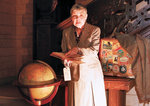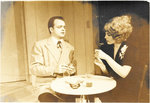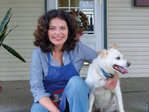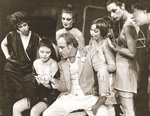



When Kristine Thatcher was 14 years old, she sat in a creaky seat in a stuffy barn in Grand Ledge and lost herself in John Peakes’ dying eyes.
The play was “A Thousand Clowns,” at the now-defunct Ledges Playhouse. Peakes played a whip-smart free spirit, a comedy writer forced to turn out commercial junk that kills his soul.
In a flash, Thatcher knew what she wanted to do with her life — and what she didn’t want to do.
And she’s still not doing it. Over the decades, Thatcher has sold out many a house as an actor, director, theater head and playwright — but she’s never sold out.
And she never gives in. Now 68, her latest “adventure,” in her words, is ovarian cancer.
“If you give in to it, you’re a goner,” she said. “I’ve been kicking cancer’s butt for seven years and I’m not going to stop. You’ve got to keep your life together, keep your wits together.”
The coming weeks offer a couple of juicy opportunities to bask in the presence of Kristine Thatcher, in person or through her vivid work as a playwright.
Beginning Oct. 3, the Williamston Theatre will present the local premiere of Thatcher’s latest work, “The Safe House.” An open house and fundraiser for Thatcher’s mounting personal expenses is set for Monday (Sept. 23) at Stober’s Bar. Thatcher will be there to greet old and new friends.
A tavern might seem to be a strange place for a fundraiser, but “The Safe House” is deeply rooted in Thatcher’s own childhood in Lansing. Her feisty German grandmother, the central figure in the play, was co-owner of Stober’s Bar when it was called the German Village.
But nostalgia isn’t Thatcher’s style. Set in the 1980s, the play tackles a sensitive issue: Should the grandmother, who is losing a few steps with age, be packed off to a nursing home?
The subject will hit close to home for a lot of people, but Thatcher’s deft braiding of humor and pathos tumbles down as naturally as life itself. (Only wittier.) She’s given voice to hundreds of tough roles and subjects as an actor and playwright, from Lady Macbeth to civil rights icon Rep. Barbara Jordan, but her approach to drama, and life, is simple.
“In every play, each character has an overall desire,” Thatcher explained. “You’ve got to figure out what that is and they’ve got to be going for that the whole way. It works because that’s sort of how it works in life. You know what you want and you go and get it — hopefully.”
Kristine Thatcher got her desire early in life and hasn’t let go yet.
Switched on from inside
Karen Stock met Kristine Thatcher in 1976, when Stock was cast in a few supporting roles in BoarsHead’s Theatre’s winter season. By then, Thatcher’s star was shining so brightly at BoarsHead that the theater’s co-founders, John Peakes and Richard Thomsen, were building seasons around her.
“Kristine was their ingénue, the lead female in just about every play during that time,” Stock said. “That’s how much confidence and faith they had in her. She was such a lovely actor with that wonderful, unusual voice.”
Thatcher’s voice is like no other sound in nature. It’s more grounded and textured now, but in her ingénue years, words just seemed to float out of her face, like violet bubbles.
Chicago actor Michael Joseph Mitchell took a stab at pinning down Thatcher’s magic, then and now.
“She’s just switched on from inside,” Mitchell said. “There’s this combination of wonder and awe, and this mischievous glint in her face, that you want to know what she’s thinking and you’ve got to know what she’s going to say next.”
Mitchell has worked in hundreds of roles, from NBC-TV’s “Chicago Fire” to a slew of Shakespeare. In 2008, Thatcher directed him in a one-man BoarsHead play, “Underneath the Lintel.”
“I am my best self as a performer and my best self, frankly, as a human being in her company,” Mitchell said. “I don’t think there’s a selfish bone in her body.”
The 1970s were halcyon years at BoarsHead. Named after the fabled tavern in Shakespeare’s “Henry IV,” BoarsHead evolved from summer stock at the Ledges to a year-round slate of classics and new plays. Falstaff and Prince Hal weren’t around, but Peakes, Thomsen, Thatcher and top actors like Anthony Heald and Carmen Decker formed the nucleus of a close-knit, evolving repertory company.
“I felt lucky for someone to cast me when I was 15 years old,” Thatcher said. “I always wanted to be an actress, but when I finally got to work with them, that did it. I was there for life.”
Hollywood actor Richard Riehle still treasures his time with BoarsHead and Thatcher in the summer of 1976 and 1977.
Riehle started out as a dead body in a John Wayne movie, the first and tiniest of nearly 200 film roles, from “The Fugitive” and “Glory” to “Fear and Loathing in Las Vegas” and the 1999 cult favorite “Office Space.” His panicky confrontation with Joe Pesci in “Casino” makes your skin crawl. He has worked with many heavyweights, but he still lights up at the memory of locking eyes with Thatcher.
“It was great to watch her work, as much as working with her,” Riehle said. “It was incredible being on stage with her, but I would just come to see her do anything, even if I wasn’t involved.”
He credits BoarsHead’s head-spinning variety of shows with helping him handle hundreds of TV roles, from “Star Trek” and “Roseanne” to “The Mindy Project” and “Black-ish.”
“The two years I spent at BoarsHead were optimal for my career,” Riehle said. “We did everything from Shakespeare to Woody Allen — and musicals. I couldn’t have done it without Kristine’s support.”
In “Guys and Dolls,” Riehle was thrust reluctantly into the lead role of Nathan Detroit, opposite Thatcher as his fiancée, Miss Adelaide.
“I’m not a musical person, but they made me sing and dance,” he said. “With her, it was a cinch. All I had to do was take a look at her on stage and I immediately knew all that I needed to know about Nathan Detroit. Her Adelaide was phenomenal, like everything else she did.”
Riehle got a face-full of Thatcher’s power in “Born Yesterday,” when he played the bullying gangster who is fleeced by a chorus girl in a tour de force card game.
“She was always right there,” Riehle said. “You knew when you looked in her direction you were going to get exactly what you needed to make that response, to do that particular bit of dialogue or bit of business.” Thatcher had equal praise for Riehle, but she didn’t let him completely off the hook. “I’ll never forget ‘Born Yesterday,’” she said. “He was so good. It doesn’t surprise me that he’s got a career that goes on and on, in so many films. But tell me — does he do any theater?”
Glowing presence
In the 1980s, Thatcher left BoarsHead and Lansing to act, direct and write plays for theaters through the Midwest and beyond, from Chicago and Milwaukee to New York and Seattle.
She taught colleges drama, made countless friends and established several bases of operation, including the Milwaukee Repertory Theater and the nation’s oldest summer theater, the Peninsula Players in Fish Creek, Wisconsin.
She found her voice as a playwright in the early 1990s with a witty, luminous drama about unsung Wisconsin poet Lorine Niedecker. Thatcher herself played the lead, to glowing reviews, at the Writer’s Theatre in Chicago in 1997. Niedecker lived in a cabin, unknown to the world, and wrote just for the love of poetry. The working artist, happy to dwell among the lakes and do her thing without clawing for fame, selling out or moving to the coast, was an apt avatar for Thatcher herself. It was the first in a growing stack of plays by Thatcher about strong, smart, funny, steadfast women well worth knowing.
In 2005, Thatcher pulled a Niedecker of sorts and came back to Lansing to become artistic director at her old haunt, BoarsHead. Although performing took a back seat to directing plays and running the theater,
Thatcher’s acting experience made her the perfect actor’s director.
Katie Doyle had many jobs at BoarsHead going back to 1971, including assistant director under Thatcher.
“She started as an actress, and she can speak to an actor from an actor’s mindset,” Doyle said.
Thatcher directed Mitchell in the one-person play, “Underneath the Lintel,” in 2008 at BoarsHead.
“It just cemented us for life,” he said. “It was the single most rewarding experience, to this day, that I’ve had in the theater.”
In Thatcher’s presence, ideas bubbled up faster than they could be processed.
The set of “Lintel” was strewn with seemingly random objects, until someone came up with the idea of using each object to underscore a plot point. When a mysterious character is identified as “A.,” a ladder was opened to form an “A” and a light lying next to the ladder was turned on, suggesting the period, and so on.
“We’d finish each other’s sentences and didn’t know whose idea was whose,” Mitchell said.
Theater lore is replete with clashes of egos, dictatorial directors and tense rehearsals, but it’s never been Thatcher’s way to dress down a performer or a stage hand, or read a crew the riot act.
“People who do that don’t accomplish a thing,” Thatcher said. “They are destroying their own work when they do that, limiting the actors. I’ve worked with directors who interpret every line for you. You don’t dare move unless they tell you to. Ugh.”
She directed Gary Houston in a Chicago run of her play about legendary Congresswoman Barbara Jordan, “Voice of Good Hope.”
“It was easy as hell for me,” Houston said. “Her way is to support the good things and the bad things will just flake away of their own weight.”
Houston saw Thatcher get upset only once, when one actor lost his temper with another in a rehearsal of “Heroes” at Stormfield Theater.
“We took a break, and when we resumed, she was still very upset about it,” he said. “It wasn’t a dressing down or an angry thing, but she was letting us know how unhappy she was about it, and we got the point.”
Doyle, who served as stage manager for part of Thatcher’s run as BoarsHead’s artistic director, can still close her eyes and hear the creative ferment and camaraderie backstage.
“There was laughter, a lot of laughter, even with a play that was more dramatic,” she said.
Thatcher would often quietly confer with the actors, with a cup of tea in her hand. Doyle watched Thatcher closely as she listened to her cast.
“She would say, ‘I hear you. Thanks for that. Let’s try it again,’” Doyle recalled. “That sounds really simple, but that’s how she treats everything. Even the cancer, she keeps on saying, 'OK, let’s get up and do this again, more chemotherapy, until we get it right.'”
Exits and entrances
Thatcher was widely credited with re-invigorating BoarsHead and bringing in younger audiences, but by 2009, the economic downturn and a loss of support from a major donor put the squeeze on a budget that was challenged in the best of times.
The theater board laid Thatcher off.
“That was a difficult time,” Doyle said.
Undaunted, Thatcher started a new theater, Stormfield, in an unlikely box of a building tucked into the Frandor Shopping Center parking lot.
Loyal Thatcherites — staff, crew and actors from Boarshead — jumped along with her into the quixotic project. Loyal donors kept the theater afloat, even though many of them sensed it was doomed.
“It was a former car wash, with a street address, in the middle of a mall,” Joan Mattson said. Mattson and her husband, Jerry, were on the Stormfield board. “No one could find it,” she said. “I wanted to paint it purple but it had to match the color scheme of the mall.”
The mix of “let’s put on a show” pluck and Actor’s Equity (union) professionalism was intoxicating. Thatcher rolled up her sleeves and dove into painting and cleaning the new space. Judo mats were hung in the windows to keep the house dark. Pots, tin cans and buckets caught leaks.
Stormfield’s first fully staged production, in October 2010, was aptly named: “Among Friends,” written by Thatcher, with Lansing mainstays Aral Gribble and John Lepard and Chicago import Bill Bannon. Thatcher’s pull with the Chicago theater community brought top talent to the humble box under the Sears tower.
“Those three guys came together, committed to it and put on one of the best productions I’ve ever seen, in that tiny little space,” Thatcher said.
2011’s bizarre “Kimberly Akimbo,” with veteran actress Carmen Decker as a prematurely aging teenager, was another highlight.
It was all over by 2012.
“We needed a full-time person just to go after the money, but we were all wearing two or three hats already,” Thatcher said. “But it was a good run.”
At about the same time, Thatcher was diagnosed with cancer. Her theater was dead. She hadn’t appeared on stage in the nearly eight years she’d spent running BoarsHead and Stormfield.
So, naturally, she said “yes” to the last thing anyone would expect. She shipped off to Chicago and starred in a demanding 90-minute, one-woman play.
“Underneath the Lintel,” rewritten for a female lead, scored big with Chicago audiences and critics. Thatcher was spellbinding as a librarian-turned-metaphysical sleuth who traces a 113-year-overdue book back to the original Wandering Jew. She was nominated for a 2013 Jefferson Award — the top theater awards in Chicago, second nationally to the Tonys — for best solo performance.
David Rice directed Thatcher in “Underneath the Lintel.”
Rice’s wife, Alison Vesely, and Kristine were close friends. Both women had ovarian cancer as they worked on the production. Vesely died in 2016.
“They were both fighting the same monster,” Rice said.
Rice and Vesely talked Kristine into doing it, despite her doubts about her energy.
“We told her we’d work around her,” Rice said. “She’s one of the most extraordinarily talented people we’d ever known. There was no question in our mind that she was more than capable of doing it.”
Thatcher begged Rice and Vesely to fire her more than once. They laughed and said “No.”
They watched her closely and made sure she got good food and plenty of rest between shows. “It took a toll, but I think it invigorated her, emotionally and mentally, because it was a triumph, and it was a part of what she needed at that moment,” Rice said.
Miracles happen here
The first read-through of “The Safe House” at Williamston Theatre last week made Thatcher very happy.
After years of fighting to keep BoarsHead and Stormfield going, she has a special regard for Williamston Theatre founders Tony Caselli, Lepard, Christine Purchis and Emily Sutton-Smith.
“They’ve got the tiniest theater, but they keep it running,” Thatcher said. “The audience alone, big or small, does not keep it open. It’s got to be so many other things that are behind the scenes. But it’s worth it because miracles happen there. People have so much fun on stage.”
Several years ago, Chicago theater director Terry McCabe named Thatcher a playwright-in-residence at City Lit Theatre.
In 2015, the partnership produced Thatcher’s play “Bloodhound Law,” a hard-hitting pre-Civil-War drama about the Chicago City Council’s decision to enforce the Fugitive Slave Act. In 2017, she finished “The Safe House,” with more plays to come.
“Bloodhound Law” was a major challenge, logistically and thematically, but “The Safe House” took Thatcher to more familiar territory. Writing dialogue for the grandmother, based on Thatcher’s own grandmother, took her back to her own childhood.
“She talks all about how she grew up in a tavern so she wanted a tavern when she grew up,” Thatcher said. “She worked at Capitol Laundry and my grandfather worked at Oldsmobile when they first got here. They saved their money and when that tavern went up for sale, they knew that was it. She used to say ‘Oh, it vas a dirty place.’ They cleaned it up and opened it within days of quitting their other jobs.”
Although “The Safe House” deals frankly with the tough theme of physical decline, it was a pleasure for her to write.
“Eventually, you don’t have to think about what you’re going to do,” she said. “The characters tell you. I know my uncle and my grandmother so well that they just talked. I could hardly keep up with them.”
McCabe expects a new play every two years from his resident playwrights, and he’s showing Thatcher no mercy. The challenge gives her a juicy bone to chew in semi-retirement, along with occasional bouts of panic.
For a while, she was unsure what to write about after “Safe House.”
“I could not land on a subject,” she said.
A few weeks ago, McCabe informed Thatcher of an obscure anecdote from American history: a bizarre 1876 plot by a band of Chicago counterfeiters to steal Abraham Lincoln’s body.
Thatcher’s mordant sense of humor, like a glowing bed of embers, flares into flame in the darkest situations. At the mention of the Lincoln plot, she smelled comedy.
“What are they going to do — sell it?” Thatcher said. “It was just the stupidest idea.”
So these days, between rounds of cancer treatment, she’s diving into research on the project and toying with all sorts of delicious ideas, like having Lincoln himself come out of the casket and narrate the story.
“It’s gotta be one I’ll really like writing,” she said.
A Night at Stober’s With Kristine Thatcher
7-10 p,m. Monday, Sept. 23
Hosted by the Kristine Thatcher Fund
Stober’s Bar
812 Michigan Ave., Lansing
Free admission
(517) 490-0481
“The Safe House”
By Kristine Thatcher
Directed by Casaundra Freeman
Oct. 3-Nov. 3, 2019
Williamston Theatre
122 S. Putnam Rd., Williamston
(517) 655-7469
Support City Pulse - Donate Today!
Comments
No comments on this item Please log in to comment by clicking here